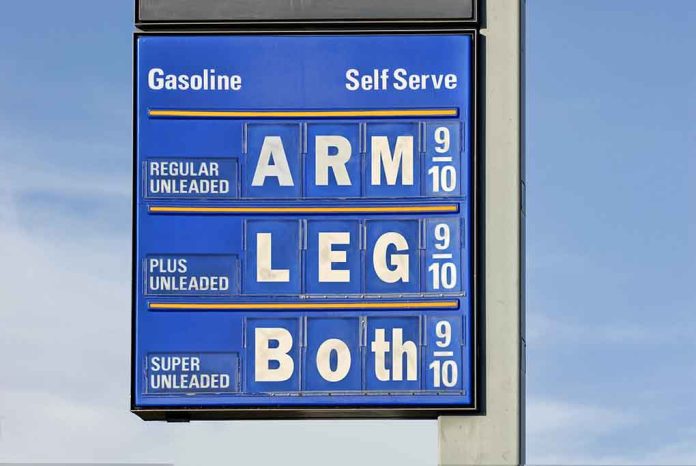
If price controls worked, would nations like the Soviet Union and Venezuela have collapsed under their own economic inefficiency? Former President Donald Trump certainly doesn’t think it did.
At a Glance
- Trump criticized Harris’s federal price control policies at a rally in Pennsylvania.
- He argued that these proposals would lead to rationing, hunger, and skyrocketing prices, similar to failed policies seen in Venezuela and the Soviet Union.
- Harris argues the controls will curb corporate exploitation, while critics say they mimic failed communist policies.
- Economists and commentators predict negative outcomes such as shortages and inflation.
- The Committee for a Responsible Federal Budget estimates Harris’s proposal could cost $1.7 trillion over a decade.
Trump Slams Harris’s Price Controls
In a fiery rally at Pennsylvania’s Mohegan Sun Arena, former President Donald Trump sharply criticized Vice President Kamala Harris’s new economic proposal, denouncing it as nothing less than Soviet-style economic policy. Trump warned that Harris’s federal price controls on food and groceries would lead to catastrophic results, including rationing, hunger, and skyrocketing prices — a troubling parallel to the economic failures of Venezuela and the Soviet Union.
Trump’s rebuke of Harris’s so-called “Kamalanomics” centers around the assertion that price controls are a recipe for disaster. He argues that such measures would wreak havoc on the economy by disrupting the balance of supply and demand, leading to shortages and black markets. Trump’s critique isn’t only about future doomsday scenarios; it’s a history lesson grounded in examples of national economic collapses.
@realDonaldTrump is right: Kamala Harris’s Soviet-style price controls would wreak havoc on our nation’s economy.
My opponent @JoshStein_’s staunch support for her policies should concern every North Carolinian. https://t.co/0HieafabyI
— Mark Robinson (@markrobinsonNC) August 17, 2024
Decoding Kamala’s Economic Fantasy
Vice President Harris unveiled her plan under the banner of an “opportunity economy,” promising federal price controls to curb corporate greed. Harris’s vision involves capping prices on essential goods and providing financial assistance through expanded programs for first-time homebuyers and new parents.
Yet, the lofty ideals of “Kamalanomics” face significant pushback.
In her defense, Harris argues that fair pricing is necessary to protect consumers from corporate exploitation. However, detractors swiftly dismissed her proposals, drawing stark comparisons to the failed economic strategies of communist regimes. Harvard economist Jason Furman criticized the feasibility of Harris’s plan, stating, “There’s no upside here, and there is some downside.” Meanwhile, Washington Post columnist Catherine Rampell underscored the dangers: “Supply and demand would no longer determine prices; far-off Washington bureaucrats would.”
“If you think things are expensive now, they will get 100 times WORSE if Kamala gets four years as President. Under her plan, Kamala will implement SOVIET Style Price Controls,” Trump wrote in a Truth Social post.
While the Biden-Harris administration doubles down on policies that seem to appeal more in theory than in practice, Trump points to historical precedence to support his dire warnings. Former attempts at price controls led to resource scarcity and economic turmoil — a narrative well-documented in nations that toyed with socialist policies. Trump insists that Harris’s plan is no different and constitutes a perilous path towards economic dysfunction.
President Trump is right—we must get America back on track. Kamala Harris’s price controls are straight out of Venezuela & China. This isn’t the direction we need.
Under Trump, we had a booming economy. With Kamala, we’ll end up with socialism.
Tune in to @larry_kudlow for… pic.twitter.com/2SIb65gW4p
— Congressman Greg Steube (@RepGregSteube) August 17, 2024
Political Rhetoric Versus Practical Reality
The stark divide between ideological stances on economic reforms is brought to the forefront with Harris’s new agenda. Trump warns young voters about the allure of politically appealing yet practically dangerous policies, labeling them as Marxist and fascist undertones. He points to how Harris’s promises echo the recent failed attempts of the Biden administration to cancel student debt, cautioning against being swayed by seemingly beneficial but ultimately destructive propositions.
“The students are saying, ‘I love him because of student debt,’ but he got rejected,” Trump said. “Her plan is very dangerous because it may sound good politically, and that’s the problem. … This is Marxist, this is fascist.”
Economists and reputable news sources alike line up in opposition to Harris’s federal price control scheme. The consensus is clear: such policies jeopardize the very essence of a free-market economy, bring inefficiencies, and lead to rationing. Given the estimated $1.7 trillion price tag over a decade as projected by the Committee for a Responsible Federal Budget, Harris’s plan is as flawed in its financial sustainability as it is in its ideological foundation.






















